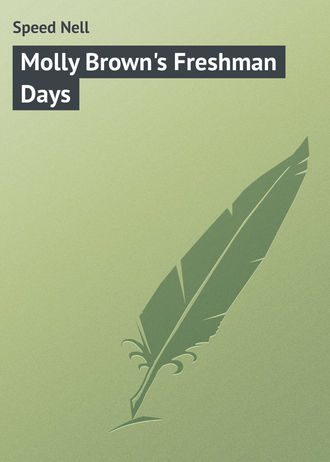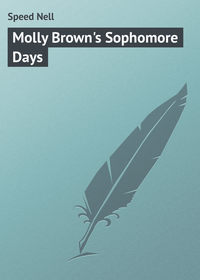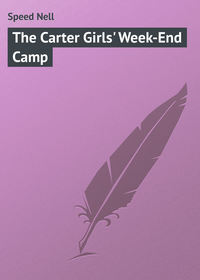 полная версия
полная версияMolly Brown's Freshman Days
“Of course, I will,” exclaimed Molly, flushing with pleasure. “There is nothing to forgive. I know I’m too indiscriminate about making friends. Mother often complained because I would bring such queer children out to dinner when I was a child. Indeed, I wasn’t hurt a bit. It was the word ‘rag-tag,’ that seemed to be such an excellent description of the clothes I must wear this winter, unless some should drop down from heaven, like manna in the desert for the Children of Israel.”
Without a word, Nance pulled a box out from under her couch and lifted the lid. It disclosed a little hand sewing machine.
“Can you sew?” she asked.
“After a fashion.”
“Well, I can. It’s pastime with me. I’d rather make clothes than do lots of other things. Now, suppose we set to work and make some dresses. How would you like a blue serge, with turn-over collar and cuffs, like that one Miss Marks is wearing, that fastens down the side with black satin buttons?”
“Oh, Nance, I couldn’t let you do all that for me,” protested Molly. “Besides, I haven’t the material or anything.”
“Why don’t you earn some money, Molly?” suggested Nance. “There are lots of different ways. Mrs. Murphy, the housekeeper, was telling me about them. One of the girls here last year actually blacked boots – but, of course, you wouldn’t do anything so menial as that.”
“Wouldn’t I?” interrupted Molly. “Just watch me. That’s a splendid idea, Nance. It’s a fine, honorable labor, as Colonel Robert Wakefield said, when his wife had to take in boarders.”
Molly slipped on the blue muslin.
“It really doesn’t make any difference what she wears,” thought Nance, looking at her friend with covert admiration. “She’d be a star in a crazy quilt.”
The two girls hurried down to supper. Molly was thoughtful all through that conversational meal. Her mind was busy with a scheme by which she intended to remove that unceasing pressure for funds which bade fair to be an ever-increasing bugbear to her.
No. 16 on the Quadrangle turned out to be a very luxurious and comfortable suite of rooms, consisting of quite a large parlor, a little den or study and a bedroom. Mary Stewart met them at the door in such a plain dress that at first Molly was deceived into thinking it was just an ordinary frock until she noticed the lines. And in a few moments Nance took occasion to inform her that simplicity was one of the most expensive things in the world, which few people could afford, and furthermore that Mary Stewart’s gray, cottony-looking dress was a dream of beauty and must have come from Paris.
There were six or seven other girls in the crowd, including that little bird-like, bright-eyed creature they called “Jennie Wren,” whose real name was Jane Wickham. The only other girl they knew was Judith Blount, who had been so snubby to Molly the day before about the luggage.
All these girls were musical, as the freshmen were soon to learn, and belonged to the College Glee Club.
“What a pretty room!” exclaimed Molly to her hostess, after she had been properly introduced and enthroned in a big tapestry chair, in which she unconsciously made a most delightful and colorful picture.
“I’m glad you like it. I have some trouble keeping it from getting cluttered up with ‘truck,’ as we call it. It’s about like Hercules trying to clean the Augean Stables, I think, but I try and use the den for an overflow, and only put the things I’m really fond of in here. That helps some.”
“They are certainly lovely,” said the young freshman, looking wistfully at the head of “The Unknown Woman,” between two brass candlesticks on the mantel shelf. On the bookshelves stood “The Winged Victory,” and hanging over the shelves on the opposite side of the room was an immense photograph of Botticelli’s “Primavera.” The only other pictures were two Japanese prints and the only other furniture was a baby grand piano and some chairs. It was really a delightfully empty and beautiful place, and Molly felt suddenly strangely crude and ignorant when she recalled the things she had intended to do to her part of the room at Queen’s Cottage toward beautifying it. She was engaged in mentally clearing them all out, when a voice at her elbow said:
“Are you thinking of taking the vows, Miss Brown?”
It was Judith Blount, who had drawn up a chair beside her’s. There was something very patronizing and superior in Miss Blount’s manner, but Molly was determined to ignore it, and smiled sweetly into the black eyes of the haughty sophomore.
“Taking what vows?” she asked.
“Why, I understood you had become a cloistered nun.”
Molly flushed. So the story was out. It didn’t take long for news to travel through a girl’s college.
“I wasn’t cloistered very long,” she answered. “And the only vow I took was never to be caught there again after six o’clock.”
“How did you like Epiménides? I hear he’s made a great joke of it,” she continued, without waiting for Molly to answer. “He’s rather humorous, you know. Even in his most serious work, it will come out.”
“I don’t think there was much to joke about,” put in Molly, feeling a little indignant. “I was awfully forlorn and miserable.”
“The real joke was that he called you ‘little Miss Smith,’” said Judith.
Molly’s moods reflected themselves in her eyes just as the passing clouds are mirrored in two blue pools of water. A shadow passed over her face now and her eyes grew darker, but she kept very quiet, which was her way when her feelings were hurt. Then Mary Stewart began to play on the piano, and Molly forgot all about the sharp-tongued sophomore, who, she strongly suspected, was trying to be disagreeable, but for what reason for the life of her Molly could not see.
Never before had she heard any really good playing on the piano, and it seemed to her now that the music actually flowed from Mary’s long, strong fingers, in a melodious and liquid stream. Other music followed. Judith sang a gypsy song, in a rich contralto voice, that Molly thought was a little coarse. Jennie Wren, who could sing exactly like a child, gave a solo in the highest little piping soprano. Two girls played on mandolins, and Mary Stewart, who appeared to do most things, accompanied them on a guitar. Then came supper, which was rather plain, Molly thought, and consisted simply of tea and cookies. “I suppose it’s artistic not to have much to eat,” her thoughts continued, but she made up her mind to invite Mary Stewart to supper before the old ham and the hickory nut cake were consumed by hungry freshmen.
“It seems to me that with such a voice as yours you must sing, Miss Brown,” here broke in Mary Stewart. “Will you please oblige the company?”
“I wouldn’t like to sing after all this fine music,” protested Molly. “Besides, I don’t know anything but darky songs.”
“The very girl we want for our Hallowe’en Vaudeville,” cried Jennie Wren. “What do you use, a guitar or a piano?”
“Either, a little,” answered Molly, blushing crimson; “but I haven’t any more voice than a rabbit.”
“Fire away,” cried Jennie Wren, thrusting a guitar into her hands.
Molly was actually trembling with fright when she found herself the center of interest in this musical company.
“I’m scared to death,” she announced, as she faintly tuned the guitar. Then she struck a chord and began:
“Ma baby loves shortnin’,Ma baby loves shortnin’ bread;Ma baby loves shortnin’,Mammy’s gwine make him some shortnin’ bread.”Before she had finished, everybody in the room had joined in. Then she sang:
“Ole Uncle Rat has come to town,To buy his niece a weddin’ gown,OO-hoo!”“A quarter to ten,” announced some one, and the next moment they had all said good-night and were running as fast as their feet could carry them across the campus, “scuttling in every direction like a lot of rats,” as Judith remarked.
“Lights out at ten o’clock,” whispered Nance breathlessly, as they crept into their room and undressed in the dark. It was very exciting. They felt like a pair of happy criminals who had just escaped the iron grasp of the law.
When Molly Brown dropped into a deep and restful sleep that night, she never dreamed that she had already become a noted person in college, though how it happened, it would be impossible to say. It might have been the Cloister story, but, nevertheless, Molly – overgrown child that she may have seemed to Professor Green – had a personality that attracted attention wherever she was.
CHAPTER V
THE KENTUCKY SPREAD
“Molly, you look a little worried,” observed Nance Oldham, two days before the famous spread was to take place, it having been set for Friday evening.
Molly was seated on her bed, in the midst of a conglomerate mass of books and clothes, chewing the end of a pencil while she knitted her brows over a list of names.
“Not exactly worried,” she replied. “But, you know, Nance, giving a party is exactly like some kind of strong stimulant with me. It goes to my head, and I seem to get intoxicated on invitations. Once I get started to inviting, I can’t seem to stop.”
“Molly Brown,” put in Nance severely, “I believe you’ve just about invited the whole of Wellington College to come here Friday night. And because you are already such a famous person, everybody has accepted.”
“I think I can about remember how many I asked,” she replied penitently. “There are all the girls in the house, of course.”
“Frances Andrews?”
Molly nodded.
“And all the girls who were at Miss Stewart’s the other night.”
“What, even that girl who makes catty speeches. That black-eyed Blount person?”
“Yes, even so,” continued Molly sadly. “I really hadn’t intended to ask her, Nance, but I do love to heap coals of fire on people’s heads, and besides, I just told you, when I get started, I can’t seem to stop. When I was younger, I’ve been known to bring home as many as six strange little girls to dinner at once.”
“The next time you give a party,” put in Nance, “we’d better make out the list beforehand, and then you must give me your word of honor not to add one name to it.”
“I’ll try to,” replied Molly with contrition, “but it’s awfully hard to take the pledge when it comes to asking people to meals, even spreads.”
The two girls examined the list together, and Molly racked her brains to try and remember any left-outs, as she called them.
“I’m certain that’s all,” she said at last. “That makes twenty, doesn’t it? Oh, Nance, I tremble for the old ham and the hickory nut cake. Do you think they’ll go round? Aunty, she’s my godmother, is sending me another box of beaten biscuits. She has promised to keep me supplied. You know, I have never eaten cold light bread in my life at breakfast, and I’d just as soon choke down cold potatoes as the soggy bread they give us here. But beaten biscuit and ham and home-made pickles won’t be enough, even with hickory nut cake,” she continued doubtfully.
“I have a chafing dish. We can make fudge; then there’s tea, you know. We can borrow cups and saucers from the others. But we’ll have to do something else for their amusement besides feed them. Have you thought of anything?”
“Lillie and Millie,” these were two sophomores at Queen’s, “have a stunt they have promised to give. It’s to be a surprise. And Jennie Wren has promised to bring her guitar and oblige us with a few selections, but, oh, Nance, except for the eatin’, I’m afraid it won’t be near such a fine party as Mary Stewart’s was.”
“Eatin’s the main thing, child. Don’t let that worry you,” replied Nance consolingly. “I think I have an idea of something which would interest the company, but I’m not going to tell even you what it is.”
Nance had a provoking way of keeping choice secrets and then springing them when she was entirely ready, and wild horses could not drag them out of her before that propitious moment.
On Friday evening the girls began to arrive early, for, as has been said, Molly was already an object of interest at Wellington College, and the fame of her beaten biscuits and old ham had spread abroad. Some of the guests, like Mary Stewart, came because they were greatly attracted toward the young freshman; and others, like Judith Blount, felt only an amused curiosity in accepting the invitation. As a general thing, Judith was a very exclusive person, but she felt she could safely show her face where Mary Stewart was.
“This looks pretty fine to me,” observed that nice, unaffected young woman herself, shaking hands with Molly and Nance.
“It’s good of you to say so,” replied Molly. “Your premises would make two of our’s, I’m thinking.”
“But, look at your grand buffet. How clever of you! One of you two children must have a genius for arrangement.”
The study tables had been placed at one end of the room close together, their crudities covered with a white cloth borrowed from Mrs. Murphy, and on these were piled the viands in a manner to give the illusion of great profusion and plenty.
“It’s Molly,” laughed Nance; “she’s a natural entertainer.”
“Not at all,” put in Molly. “I come of a family of cooks.”
“And did your cook relatives marry butlers?” asked Judith.
Molly stifled a laugh. Somehow Judith couldn’t say things like other girls. There was always a tinge of spite in her speeches.
“Where I come from,” she said gravely, “the cooks and butlers are colored people, and the old ones are almost like relatives, they are so loyal and devoted. But there are not many of those left now.”
The room was gradually filling, and presently every guest had arrived, except Frances Andrews.
“We won’t wait for her,” said Molly to Lillie and Millie, the two inseparable sophomores, who now quietly slipped out. Presently, Nance, major domo for the evening, shoved all the guests back onto the divans and into the corners until a circle was formed in the centre of the room. She then hung a placard on the knob of the door which read:
MAHOMET, THE COCK OF THE EAST,vsCHANTECLER, THE COCK OF THE WESTThere was a sound of giggling and scuffling, the door opened and two enormous, man-sized cocks entered the room. Both fowls had white bodies made by putting the feet through the sleeves of a nightgown, which was drawn up around the neck and over the arms, the fullness gathered into the back and tied into a rakish tail. A Persian kimono was draped over Mahomet to represent wings and a tightly fitting white cap with a point over the forehead covered his head. His face was powdered to a ghastly pallor with talcum and his mouth had been painted with red finger-nail salve into a cruel red slash across his countenance. Chantecler was of a more engaging countenance. A small red felt bedroom slipper formed his comb and a red silk handkerchief covered his back hair. The two cocks crowed and flapped their wings and the fight began, amid much laughter and cheering. Twice Chantecler was almost spurred to death, but it was Mahomet’s lot to die that evening, and presently he expired with a terrible groan, while the Cock of the West placed his foot on Mahomet’s chest and crowed a mighty crow, for the West had conquered the East.
That was really the great stunt of the evening, and it occupied a good deal of time. Molly began carving the ham, which she had refused to do earlier, because a ham, properly served, should appear first in all its splendid shapely wholeness before being sliced into nothingness. Therefore she now proceeded to cut off thin portions, which crumbled into bits under the edge of the carving knife borrowed from Mrs. Murphy. But the young hostess composedly heaped it upon the plates with pickle and biscuit, and it was eaten so quickly that she had scarcely finished the last serving before the plates were back again for a second allowance.
During the hot fudge and hickory nut cake course, the door opened and a Scotch laddie, kilted and belted in the most approved manner entered the room. His knees were bare, he wore a little Scotch cap, a black velvet jacket and a plaidie thrown over one shoulder. But the most perfect part of his get-up was his miniature bagpipe, which he blew on vigorously, and presently he paused and sang a Scotch song.
“Nance!” cried several of the Queen’s Cottage girls, for it was difficult to recognize the quiet young girl from Vermont in this rakish disguise.
In the midst of the uproar there was a loud knock on the door.
“Come in,” called Molly, a little frightened, thinking, perhaps, the kindly matron had for once rebelled at the noise they were making.
Slowly the door opened and an old hag stepped into the room. She was really a terrible object, and some of the girls shrieked and fell back as she advanced toward the jolly circle. Her nose was of enormous length, and almost rested on her chin, like a staff, like the nose of “The Last Leaf on the Tree.” Also, she had a crooked back and leaned heavily on a stick. On her head was a high pointed witch’s cap. She wore black goggles, and had only two front teeth. The witch produced a pack of cards which she dexterously shuffled with her black gloved hands. Then she sat down on the floor, beckoning to the girls to come nearer.
“Half-a-minute fortune for each one,” she observed in a muffled, disguised voice, but it was a very fulsome minute, as Judy remarked afterward, for what little she said was strictly to the point.
To Judith Blount she said:
“English literature is your weak point. Look out for danger ahead.”
This seemed simple enough advice, but Judith flushed darkly, and several of the girls exchanged glances. Molly, for some reason, recalled what Judith had said about Professor Edwin Green.
Many of the other girls came in for knocks, but they were very skillful ones, deftly hidden under the guise of advice. To Jennie Wren the witch said:
“Be careful of your friends. Don’t ever cultivate unprofitable people.”
To Nance Oldham she said:
“You will always be very popular – if you stick to popular people.”
It was all soon over. Molly’s fortune had been left to the last. The strange witch had gone so quickly from one girl to another that they had scarcely time to take a breath between each fortune.
“As for you,” she said at last, turning to Molly, “I can only say that ‘kind hearts are more than coronets, and simple faith than Norman blood,’ and by the end of your freshman year you will be the most popular girl in college.”
“Who are you?” cried Molly, suddenly coming out of her dream.
“Yes, who are you?” cried Judith, breaking through the circle and seizing the witch by the arm.
With a swift movement the witch pushed her back and she fell in a heap on some girls who were still sitting on the floor.
“I will know who you are,” cried Jennie Wren, with a determined note in her high voice, as she grasped the witch by the arm, and it did look for a moment as if the Kentucky spread were going to end in a free-for-all fight, when suddenly, in the midst of the scramble and cries, came three raps on the door, and the voice of the matron called:
“Young ladies, ten o’clock. Lights out!”
The girls always declared that it was the witch who had got near the door and pushed the button which put out every light in the room. At any rate, the place was in total darkness for half a minute, and when Molly switched the lights on again for the girls to find their wraps the witch had disappeared.
In another instant the guests had vanished into thin air and across the moonlit campus ghostly figures could be seen flitting like shadows over the turf toward the dormitories, for there was no time to lose. At a quarter past ten the gates into the Quadrangle would be securely locked.
Nance lit a flat, thick candle, known in the village as “burglar’s terror,” and in this flickering dim light the two girls undressed hastily.
Suddenly Molly exclaimed in a whisper:
“Nance, I believe it was Frances Andrews who dressed up as that witch, and I’m going to find out, rules or no rules.”
She slipped on her kimono and crept into the hall. The house was very still, but she tapped softly on Frances’ door. There was no answer, and opening the door she tiptoed into the room. A long ray of moonlight, filtering in through the muslin curtains, made the room quite light. There was a smell of lavender salts in the air, and Mollie could plainly see Frances in her bed. A white handkerchief was tied around her head, as if she had a headache, but she seemed to be asleep.
“Frances,” called Molly softly.
Frances gave a stifled sob that was half a groan and turned over on her side.
“Frances,” called Molly again.
Frances opened her eyes and sat up.
“Is anything the matter?” she asked.
Molly went up to the bedside. Even in the moonlight she could see that Frances’ eyes were swollen with crying.
“I was afraid you were ill,” whispered Molly. “Why didn’t you come to the spread?”
“I had a bad headache. It’s better now. Good night.” Molly crept off to her room.
Was it Frances, after all, who had broken up her party?
Molly was inclined to think it was not, and yet —
“At any rate, we’ll give her the benefit of the doubt, Nance,” she whispered.
But there were no doubts in Nance’s mind.
CHAPTER VI
KNOTTY PROBLEMS
“I tell you things do hum in this college!” exclaimed Judy Kean, closing a book she had been reading and tossing it onto the couch with a sigh of deep content.
“I don’t see how you can tell anything about it, Judy,” said Nance severely. “You’ve been so absorbed in ‘The Broad Highway’ every spare moment you’ve had for the last two days that you might as well have been in Kalamazoo as in college.”
“Nance, you do surely tell the truth, the whole truth and nothing but the truth,” said Judy good naturedly. “I know I have the novel habit badly. It’s because I had no restraint put upon me in my youth, and if I get a really good book like this one, I just let duty slide.”
“Why don’t you put your talents to some use and write, then?” demanded Nance, who enjoyed preaching to her friends.
“Art is more to my taste,” answered Judy.
“Well, art is long and time is fleeting. Why don’t you get busy and do something?” exclaimed the other vehemently. “What do you intend to be?”
Judy had a trick of raising her eyebrows and frowning at the same time, which gave her a serio-comic expression and invested her most earnest speeches with a touch of humor. But she did not reply to Nance’s question, having spent most of her life indulging her very excellent taste without much thought for the future.
“What do you intend to be?” she asked presently of Nance, who had her whole future mapped out in blocks: four years at college, two years studying languages in Europe, four years as teacher in a good school, then as principal, perhaps, and next as owner of a school of her own.
“Why, I expect to teach languages,” said Nance without a moment’s hesitation.
“Of course, a teacher. I might have known!” cried Judy. “You’ve commenced already on me – your earliest pupil!
“‘Teacher, teacher, why am I so happy, happy, happy,In my Sunday school?’”She broke off with her song suddenly and seized Nance’s hand.
“Please don’t scold me, Nance, dear. I know life isn’t all play, and that college is a serious business if one expects to take the whole four years’ course. I’ve already had a warning. It came this morning. It’s because I’ve been cutting classes. And I have been entirely miserable. That’s the reason I’ve been so immersed in ‘The Broad Highway.’ I’ve been trying to drown my sorrows in romance. I know I’m not clever – ”
“Nonsense,” interrupted the other impatiently. “You are too clever, you silly child. That’s what is the matter with you, but you don’t know how to work. You have no system. What you really need is a good tutor. You must learn to concentrate – ”
“Concentrate,” laughed Judy. “That’s something I never could do. As soon as I try my thoughts go skylarking.”
“How do you do it?”
“Well, I sit very still and dig my toes into the soles of my shoes and my finger nails into the palms of my hands and say over and over the thing I’m trying to concentrate on.”
The girls were still laughing joyously when Molly came in. Her face wore an expression of unwonted seriousness, and she was frowning slightly. Three things had happened that morning which worried her considerably.
The first shock came before breakfast when she had looked in her handkerchief box where she kept her funds promiscuously mixed up with handkerchiefs and orris root sachet bags and found one crumpled dollar bill and not a cent more. There was a kind of blind spot in Molly’s brain where money was concerned, little of it as she had possessed in her life. She never could remember exactly how much she had on hand, and change was a meaningless thing to her. And now it was something of a blow to her to find that one dollar must bridge over the month’s expenses, or she must write home for more, a thing she did not wish to do, remembering the two acres of apple orchard which had been sunk in her education.









